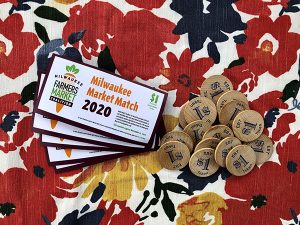Contact: Christine Holm
“How people show up to and shop at their market is a story that doesn’t often get told.” When FoodWIse Healthy Communities Coordinator Meg Kilkenny talks about the Milwaukee Farmers Market Coalition, she shares how access to healthy, local foods is a process of engaging with our neighbors. 
While markets have been community mainstays for local produce, they have also been transformed as spaces of leisure – more a day trip for delicacies than a weekly stop for groceries. With this shift has come challenges to the inclusivity of low-income consumers, economically and culturally. Those who might live near a market may invest a great deal of time to trek across town to a commercial grocery store to find affordable fruits and vegetables, taking their purchasing power out of the nearby community and away from hardworking farmers.
Fondy Farmers Market has had a neighborhood foothold for over 100 years, serving as a source of fresh produce and community on the northside of Milwaukee. As the first Wisconsin market to accept SNAP, Fondy recognized an important disparity in who was welcome and had access to local, fresh produce. Growing out of the success started at Fondy Farmers’ Market, the Milwaukee Farmers Market Coalition — co-facilitated by Kilkenny at FoodWIse and Executive Director Jennifer Casey at the Milwaukee nonprofit Fondy Food Center — has been working to support inclusivity at the markets, to entrepreneurs and low-income consumers throughout the city.
In the Coalition, FoodWIse, funded by SNAP-Ed, offers important support in marketing and outreach. Online resources such as Milwaukee Farmers Market maps, developed in collaboration with Hunger Task Force, help consumers know what to expect before stopping at the market. Whenthey arrive onsite, signage clarifies where and how to use benefits. Banners and flags function as welcome signs to low-income consumers, supporting the mission to make markets more inclusive.
FoodWise also offers technical assistance in the growth of markets accepting SNAP benefits. At the end of the 2019 market season consumers could use their SNAP benefits at nine locations throughout Milwaukee. As plans for the 2020 season started alongside the COVID-19 outbreak, the focus became how markets could welcome consumers safely. With community health at stake providing nutritious foods became an even higher priority. The Coalition offered advice on operations protocol and signs to inform vendors and visitors on expectations of safe shopping. Meeting every other week rather than every other month, bringing in state and local health departments, these efforts led to a successful season.
While it can be challenging to track metrics, the anecdotal evidence suggests SNAP sales at farmers markets have been up in Milwaukee during 2020. Consumers could have confidence in the safety of outdoor markets and the freshness of their produce and they found ways to connect despite the need for distance.
Additional support for access by low-income consumers came through a grant from the Greater Milwaukee Foundation. This grant supported five neighborhood markets – Fondy, Greenfield, Riverwest, Shorewood and Tosa – in piloting the Milwaukee Market Match. Nutrition incentives such as Match doubles spending power up to $20 a day. Programs like these stretch the consumers’ dollar, increase the individual intake of fruits and vegetables, and keep that spending in the community with local farmers. Such incentives break harmful cycles and begin new beneficial ones.
Looking forward, efforts to coordinate and standardize token systems, as well as continue the reach of those accepting benefits, will be a priority. As the 2020 season wraps up, the uncertainty of the next one comes with a clarity that the health and well-being of a neighborhood comes from many factors.
This year in particular, “Markets offer a community space that has been grieved with the loss of other events like festivals throughout Milwaukee’s summer,” Kilkenny explained. With ease of using benefits, as well as an invitation that all are welcome, communities of wellness will take root and grow in these vibrant grounds of Milwaukee.



